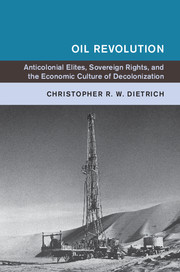Book contents
- Oil Revolution
- Global and International History
- Oil Revolution
- Copyright page
- Dedication
- Dedication
- Contents
- Figures
- Acknowledgments
- Abbreviations
- Introduction
- 1 One Periphery
- 2 Past Concessions
- 3 Histories of Petroleum Colonization
- 4 Rights and Failure
- 5 Nationalist Heroes
- 6 A Turning Point of Our History
- 7 A Fact of Life
- 8 The OPEC Syndrome
- Conclusion
- Book part
- Bibliography
- Index
- References
Bibliography
Published online by Cambridge University Press: 04 July 2017
- Oil Revolution
- Global and International History
- Oil Revolution
- Copyright page
- Dedication
- Dedication
- Contents
- Figures
- Acknowledgments
- Abbreviations
- Introduction
- 1 One Periphery
- 2 Past Concessions
- 3 Histories of Petroleum Colonization
- 4 Rights and Failure
- 5 Nationalist Heroes
- 6 A Turning Point of Our History
- 7 A Fact of Life
- 8 The OPEC Syndrome
- Conclusion
- Book part
- Bibliography
- Index
- References
- Type
- Chapter
- Information
- Oil RevolutionAnti-Colonial Elites, Sovereign Rights, and the Economic Culture of Decolonization, pp. 325 - 344Publisher: Cambridge University PressPrint publication year: 2017

